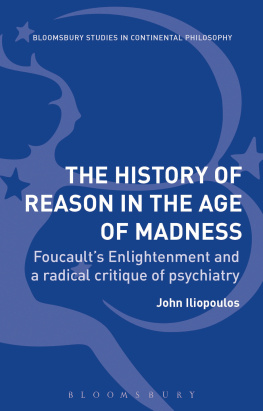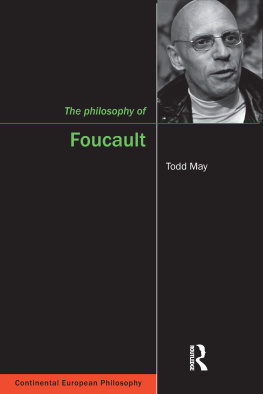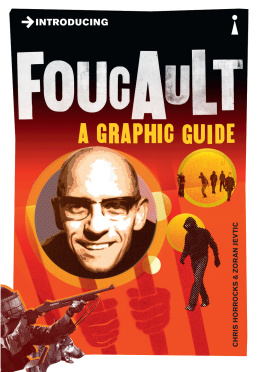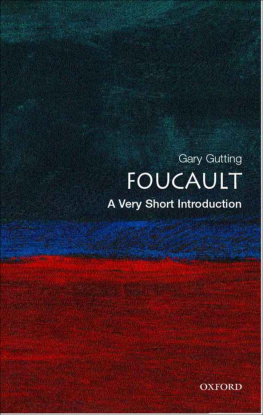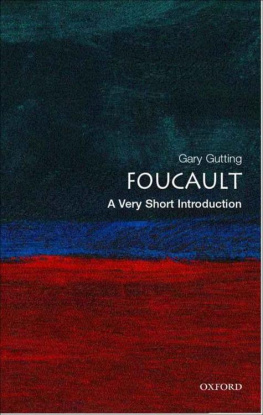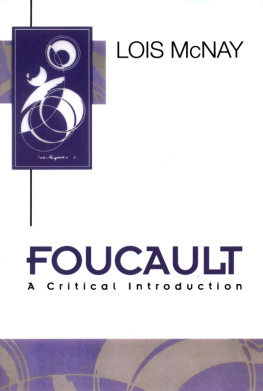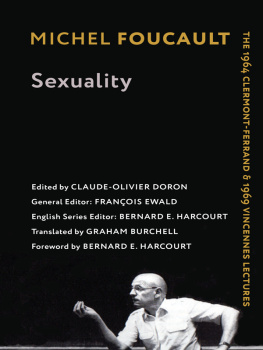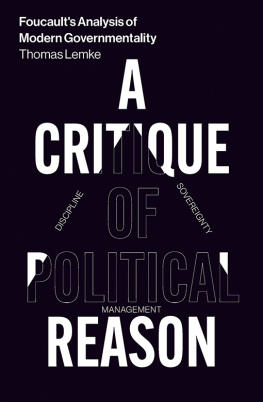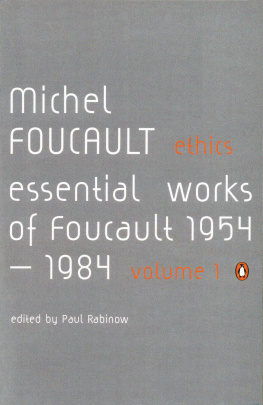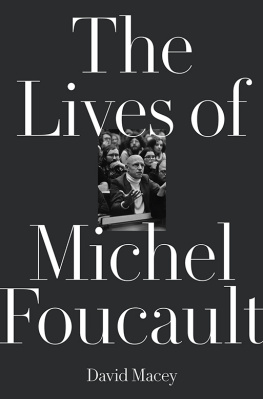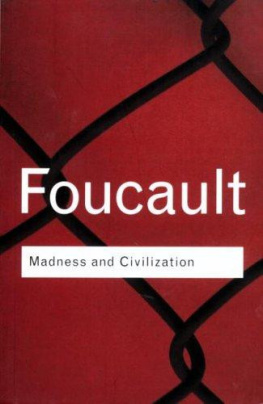Foucault Michel - The history of reason in the age of madness: Foucaults enlightenment and a radical critique of psychiatry
Here you can read online Foucault Michel - The history of reason in the age of madness: Foucaults enlightenment and a radical critique of psychiatry full text of the book (entire story) in english for free. Download pdf and epub, get meaning, cover and reviews about this ebook. City: London;New York, year: 2017, publisher: Bloomsbury UK;Bloomsbury Academic, genre: Science. Description of the work, (preface) as well as reviews are available. Best literature library LitArk.com created for fans of good reading and offers a wide selection of genres:
Romance novel
Science fiction
Adventure
Detective
Science
History
Home and family
Prose
Art
Politics
Computer
Non-fiction
Religion
Business
Children
Humor
Choose a favorite category and find really read worthwhile books. Enjoy immersion in the world of imagination, feel the emotions of the characters or learn something new for yourself, make an fascinating discovery.
- Book:The history of reason in the age of madness: Foucaults enlightenment and a radical critique of psychiatry
- Author:
- Publisher:Bloomsbury UK;Bloomsbury Academic
- Genre:
- Year:2017
- City:London;New York
- Rating:3 / 5
- Favourites:Add to favourites
- Your mark:
- 60
- 1
- 2
- 3
- 4
- 5
The history of reason in the age of madness: Foucaults enlightenment and a radical critique of psychiatry: summary, description and annotation
We offer to read an annotation, description, summary or preface (depends on what the author of the book "The history of reason in the age of madness: Foucaults enlightenment and a radical critique of psychiatry" wrote himself). If you haven't found the necessary information about the book — write in the comments, we will try to find it.
Foucault Michel: author's other books
Who wrote The history of reason in the age of madness: Foucaults enlightenment and a radical critique of psychiatry? Find out the surname, the name of the author of the book and a list of all author's works by series.
The history of reason in the age of madness: Foucaults enlightenment and a radical critique of psychiatry — read online for free the complete book (whole text) full work
Below is the text of the book, divided by pages. System saving the place of the last page read, allows you to conveniently read the book "The history of reason in the age of madness: Foucaults enlightenment and a radical critique of psychiatry" online for free, without having to search again every time where you left off. Put a bookmark, and you can go to the page where you finished reading at any time.
Font size:
Interval:
Bookmark:

The History of Reason in
the Age of Madness
Also available from Bloomsbury
Death and the Labyrinth , Michel Foucault
Democracy and Ontology, Irena Rosenthal
Foucault and Power , Marcelo Hoffman
Foucaults Heidegger , Timothy Rayner
Foucault , Gilles Deleuze
Castoriadis, Foucault, and Autonomy , Marcela Tovar-Restrepo
Foucault and Fiction , Timothy OLeary
The History of Reason in
the Age of Madness
Foucaults Enlightenment and a
Radical Critique of Psychiatry
John Iliopoulos
Bloomsbury Academic
An imprint of Bloomsbury Publishing Plc

Contents
The Enlightenment is a diverse and complex phenomenon. Its historical origins are difficult to locate, and there is no general consensus on how to determine its goals and objectives.
Owing to these diverse and opposing attitudes, Foucaults own involvement with the Enlightenment has been subject to conflicting interpretations. His work is still the object of an ongoing debate about the position he occupies in relation to the Enlightenment. One trend of thought regards Foucault, along with thinkers such as Derrida, Lyotard and Rorty, as a postmodern thinker.
The present study offers an alternative to these interpretations that will shed new light on Foucaults relationship with the Enlightenment and the critical-historical aspect of his work. Its aim is to show how Foucault is neither an anti-Enlightenment thinker who rejects reason and truth, nor a defender of the Enlightenment who had come to abandon his earlier preoccupation with the interpenetration of power and knowledge. His project rests precisely on the idea that there is no necessary for or against the Enlightenment. Foucaults relationship with the Enlightenment engages at length with the question: What is this Reason that we use?
Kants method of questioning the pretensions of rationality and reflecting on the limits of who we are through reason inspired Foucault to analyse the birth of the human sciences and especially of psychiatry, which will constitute the main focus of this study. This chapter provides an outline of his critical-historical endeavour, highlighting the mutually supportive and subversive interaction of rationality and reason, which will be crucial for interpreting how Foucault constructs his History of Madness and his subsequent reflections on the domains and limits of psychiatric discourse and practice.
Rationality and Reason The Blackmail of the Enlightenment
From the outset, Foucault makes it clear that the exploration of the limits of reason does not mean that reason is the enemy of critical thought. As he admits, It is not reason in general that I am fighting. I could not fight reason. Thus the crucial distinction on which Foucaults enterprise rests is that between reason and forms of rationality:
This distinction is extremely difficult but crucial to elucidate. Forms of rationality are not opposed to reason but, on the contrary, they stem from a basic trust in reason, as Nietzsche would say. By necessity, a form of rationality cannot be free in its use since it is placed at the service of the specific role the individual has to play in a society as a worker, a scientist, a soldier or a taxpayer. By contrast, reason has no practical, but only reflective applicability; its role is to work at the limits of thought. Reasoning as a reasonable being, as a member of a reasonable community and not as a cog in a machine, is a purely critical operation, which is free in its public use in the spirit of the Enlightenment. Kant accepts the necessity of a development of certain modes of rationality to be applied to social affairs, but the core of enlightened thought consists of being capable of critiquing these affairs in an open and public manner. The mode of rationality structures reality by assuming the status of a universal and global way of thinking; reason, by contrast, reflects critically on the values that permeate it, the principles that govern it and the historical conditions from which it arose.
The distinction between forms of rationality and reason should not create the illusion that their opposition is as clear cut as it may seem. It should not generate the nave optimism that critiquing the contingency of rationality in the name of pure reason as a higher tribunal will settle the question of the Enlightenment once and for all. Rationality and reason constitute two simultaneous operations (practical and critical) of the same faculty (reason) and therefore their mutual exchange and interdependence needs to be taken into account before we begin analysing their critical interaction: if critical Humanist and phenomenological critique have failed to recognize the subtle distinction between rationality as the domain of knowledge and reason as its limit and instead set in motion the dialectical opposition between the two terms.
Foucault, on the contrary, insists that there is no essence, no a priori nature of reason which, in the process of its implementation, supposedly loses its basic design by falling into contradictions and irrationalities. of reason that analyses and reflects upon the limits of rationality; it is the critical work of reason reflecting on the boundaries of our knowledge, on what is accepted as rational, true and real.
Foucaults Enlightenment and Kants Epistemology
For Kant, the dynamic interaction between rationality and reason is first and foremost an epistemological problem, a philosophical question pertaining to the faculties of human cognition and the necessary limitations of knowledge. It is therefore from Kants abiding preoccupation with human finitude and the possibility of its transparency to knowledge that this analysis must begin. Foucault had shared this preoccupation and already from the early stages of his work he had set out to implement it to the study of concrete practices and institutions. Closely reading Kants texts, Foucault investigated the question of critique and its essential connection to the limits of rationality. With the help of the Kantian Critiques , he demonstrated how the fundamental tension between rationality and reason became an area of philosophical concern since Kant and how it has informed psychiatric practice and theory from the late eighteenth century to the present.
Kants basic motto, his instruction to those who seek to put their reason to work is: Aude sapere: have the courage, the audacity, to know.
Reason has no end other than itself; therefore, when it is forced to pursue ends foreign to reflection and speculation, it necessarily generates illusions. Reason is sacrificed the moment it is turned into a principle. This is how rationality is born.
Reason carries out its critical enterprise when it questions its own elevation to the status of a principle of knowledge. Reason does not legislate. It purges itself of any teleology and assumes its position at the limits of knowledge. In its critical role, therefore, it does not provide the wealth of the source of knowledge, but the rigour of its limit. The attitude of the Enlightenment begins when, by rigorously demarcating the limits of the understanding, reason ensures its legitimate application, rendering the subject autonomous precisely by abolishing the need to appeal to an external authority.
The Anthropology
Foucaults late theoretical analysis of Kants critique and the Enlightenment can now shed retrospective light on the way he had tackled the same topics at the early stages of his philosophical career, by way of psychiatry. Foucaults treatise, Introduction to Kants Anthropology from a Pragmatic Point of View constitutes the theoretical background of his writings on mental health, from his famous Mental Illness and Psychology and the History of Madness , up to his recently published lectures on psychiatry. In his Introduction , Foucault argues that Kants anthropology is an exemplary form of Enlightenment critique, opening up a field of research where man himself becomes both the object of rational analysis and at the same time an area of perception whose limitations are submitted to strict interrogation by reason. Kants anthropological project, Foucault insists, is part and parcel of the three Critiques and must be considered as their continuation and completion: The Anthropology says nothing other than what is said in the Critique : we need only glance through the 1798 text to see that it covers exactly the same ground as the critical enterprise. The Anthropology constitutes Foucaults first systematic attempt to apply Kants analytic of finitude to the concrete investigation of psychiatric theory and practice as it appeared in the west during the period which has been named the Enlightenment.
Font size:
Interval:
Bookmark:
Similar books «The history of reason in the age of madness: Foucaults enlightenment and a radical critique of psychiatry»
Look at similar books to The history of reason in the age of madness: Foucaults enlightenment and a radical critique of psychiatry. We have selected literature similar in name and meaning in the hope of providing readers with more options to find new, interesting, not yet read works.
Discussion, reviews of the book The history of reason in the age of madness: Foucaults enlightenment and a radical critique of psychiatry and just readers' own opinions. Leave your comments, write what you think about the work, its meaning or the main characters. Specify what exactly you liked and what you didn't like, and why you think so.

